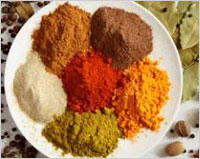

Health benefits of kitchen spices
TOI
- Discover the health benefits of spices used regularly in your kitchen.
12 Jul 2012: A kitchen shelf which boasts of bottles containing turmeric (haldi), asefoetida (heeng), cumin seeds (jeera) and the like is a common sight in Indian household. These spices not only add taste to your food but they possess immense health benefits. Here goes a list of health benefits of these humble ingredients used in most Indian kitchens.
 Turmeric: Rich in antioxidants, researchers have discovered the power of turmeric. There are reports that it may help in the fight against cancer. Studies show that it may help prevent Alzheimer’s disease and joint inflammation. Turmeric also helps in minimizing liver damages caused by taking excessive alcohol consumption or regular use of pain-killers. And no wonder why grandmothers across the country advise one to have a warm glass of milk with turmeric in case of cold and cough.
Turmeric: Rich in antioxidants, researchers have discovered the power of turmeric. There are reports that it may help in the fight against cancer. Studies show that it may help prevent Alzheimer’s disease and joint inflammation. Turmeric also helps in minimizing liver damages caused by taking excessive alcohol consumption or regular use of pain-killers. And no wonder why grandmothers across the country advise one to have a warm glass of milk with turmeric in case of cold and cough.
Asafoetida: Heeng or asefoetida is strong in taste with its pungent flavour. Add a pinch of heeng while making khatti mithi dal and you can see yourself the change of taste and aroma. This flavoring agent has wonderful health benefits as it helps in digestion. It is useful in the treatment of respiratory disorders like cough, asthma and bronchitis. Asafoetida is considered useful in the treatment of health problems concerning women such as unusually painful and excessive menstruation.
Cumin seeds: Jeera, the humble spice is very popular in most Indian kitchens. Roasted jeera powder can add flavor to a dish. In traditional odiya cuisine, roasted cumin and red chilli is grinded into a fine powder and used to enhance taste. Antiseptic properties of cumin can help fight flu by boosting your immune system. A cup of water boiled with cumin seeds, ginger, basil leaves and honey, can give great relief. Cumin helps control stomach pain, indigestion, diarrhoea, nausea and morning sickness. Cumin seeds also contain a good amount of iron. It’s a good idea to include jeera in everyday preparations like parathas, curries, cookies, soups, rice and lentil preparations.